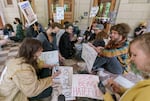Portland City Council heard strong opposition Wednesday to a proposal to ban homeless camping on public property. More than 100 Portlanders shared testimony with commissioners — virtually and in-person — during the course of a five-hour council meeting.

Opponents of a proposed camping ban protest outside of Portland City Hall, May 31, 2023.
Kristyna Wentz-Graff / OPB
“This proposition, it will immediately make your life criminal for just being alive,” said Street Roots vendor George McCarthy, who said he was homeless in Portland for 10 years. “This will make it much harder for the most vulnerable people in the city to live.”
The ordinance would ban camping on public property from 8 a.m. to 8 p.m., and introduce stricter rules on camping during all other hours. Mayor Ted Wheeler first introduced the proposal last week, and city council is expected to vote on the policy June 7.
“I believe that this would be helpful for those who are currently struggling on our streets,” Wheeler said, “and I believe that this is what Portlanders in general are asking for as well.”
While the majority of those testifying Wednesday opposed the ban, several dozen people applauded the policy. Most of those supporters were business owners based in Portland’s Central Eastside or residents with safety concerns about homeless encampments in their neighborhood.

Portland Mayor Ted Wheeler speaks the crowd, informing them that the hearing will be conducted virtually if there are any disturbances during testimony on the proposed camping ban, May 31, 2023.
Kristyna Wentz-Graff / OPB
The city already prohibits camping on public property outright, but that rule could be in violation of a new Oregon law in July. House Bill 3115, which passed the Legislature in 2021, requires cities make “objectively reasonable” rules about when, where and how people can sit and lie outdoors on public property. City attorneys believe a policy that allows people to camp during some hours — 8 a.m. to 8 p.m. —will meet that “objectively reasonable” requirement.
If approved, the new policy would additionally limit camping on public property overnight. Between 8 p.m. and 8 a.m., people won’t be able to camp in parks, on docks, riverbanks, alongside busy streets, or in areas within 250 feet of a school or city-sanctioned homeless village. The city has not identified public property where people will be allowed to set up a tent overnight without facing penalties. The new rule also bans homeless campers from starting a fire, using a gas heater, littering and selling bikes or cars at their location.
If people violate any of these new rules twice, they will be given a written warning from a Portland police officer. If they violate the camping policy three times, police can fine them up to $100 or sentence them to jail for up to 30 days.
Civil rights attorneys argued Wednesday that the proposal likely violates state and federal law. Ed Johnson, the director of litigation at Oregon Law Center said there is “no doubt” the law will be challenged in court, as it does not meet an “objectively reasonable” standard.
“It is not reasonable to expect people to pack up and disappear every morning when they have nowhere to go,” Johnson said. “It is unreasonable to throw people in jail for 30 days after two warnings for violating an incomprehensible law.”
A lawyer with the ACLU of Oregon seconded Johnson’s analysis, adding that the policy may also be unconstitutional under Martin v. Boise, a 2018 federal ruling by the U.S. Ninth Circuit Court of Appeals that prohibits cities from arresting people for sleeping on public property — unless there is enough shelter available to accommodate a city’s homeless population. Others argued that the ban would unfairly impact people who don’t normally sleep during the nighttime, and rely on sleeping in their tent during the day. That population includes people who work night shifts or feel particularly unsafe at night.

Michelle Hornbeck, left, and Emily Ausman protest outside Portland City Hall, May 31, 2023. The Portland City Council heard over five hours of testimony on a proposal to ban homeless camping on public property in Portland.
Kristyna Wentz-Graff / OPB
“Safety is an issue,” said Michelle Hornbeck, who said she has previously been homeless. “We have women [and] children that are homeless, and to ask them to sleep at night is totally unrealistic. We don’t sleep at night. That’s when the mother in us comes out, that’s when the survivor in us comes out.”
More raised concerns that ticketing and arresting people experiencing homelessness will only make it harder for them to leave homelessness behind.
“Slapping $100 fines on homeless Portlanders will result in warrants and jail time that raise, rather than lower, barriers to health and housing,” said Sandra Comstock, director of homeless service provider Hygiene 4 All.
Wheeler’s proposal appeared to go too far for some business owners who’ve long called for more action from the city. Jason Bolt, the owner of Revant Optics, urged city council to first address the needs of Portland’s homeless community before rushing to criminalize them.
“Today’s discussion goes beyond clearing our streets of tents and trash. It’s about how we treat approximately 6,000 fellow human beings who are currently suffering on our streets,” Bolt said. “The only way we are going to solve this humanitarian catastrophe is by first prioritizing care for our most vulnerable and working together as a community to help them.”

Skyler Brocker-Knapp, a policy advisor for Ted Wheeler, left, and City Attorney Robert Taylor present information to the Portland City Council on the proposed camping ban, May 31, 2023. The council heard over five hours of testimony on the proposal, which would ban camping from 8 a.m. to 8 p.m.
Kristyna Wentz-Graff / OPB
Skyler Broker-Knapp, a policy advisor for Mayor Ted Wheeler, said Wednesday that enforcement of the policy will be “phased in” after the first of the city’s large-scale outdoor encampments opens in July. Dubbed “Temporary Alternative Shelter Sites” by the city, these mass camps will offer space for an estimated 150 people to sleep in outdoor sleeping pods across the city. The first is planned to open in Southeast Portland.
The city plans to open another outdoor large encampment with the same capacity by the fall, and hopes to open six more in the coming years.
According to Multnomah County data, the county currently has 2,000 shelter beds open to the public, and around 90% of those are usually occupied. As of January, the county’s homeless population on any given night is estimated to be more than 6,200.
On Wednesday, City Commissioner Carmen Rubio introduced an amendment that would pause the fines and jail time associated with the policy until the city has created enough shelter space.
“My amendment makes it clear that we are aligning our timelines to match with the increase in available shelter sites,” Rubio said.

Opponents of a proposed camping ban snap their fingers, agreeing with testimony at a Portland City Council meeting in Portland, May 31, 2023.
Kristyna Wentz-Graff / OPB
Her proposal elicited cheers and applause from those listening in council chambers, but didn’t gain similar support from her colleagues.
“I would like to maintain the flexibility that is in this ordinance,” Wheeler said. Rubio cast the only vote in support of her amendment, which failed.
Business owners who support the proposal said the ban is critical to keep businesses in Portland.
Jonathan Malsin said his company, Beam Development, regularly works with businesses located in Portland’s Central Eastside, who frequently share their frustrations about the prevalence of tents in the neighborhood.
“The primary concern we hear from small businesses is the lack of safety on the street, thus making it extremely different to sustain or grow a business,” Malsin said. “The main factor driving the perception and reality of an unsafe district has been the proliferation of unsanctioned camping.”
Other Portlanders said they felt unsafe due to homeless encampments in their neighborhood. Edward Kay said his car was stolen a few months ago, and police discovered it in a homeless encampment. Kay, who moved to Portland in the past year, said he doesn’t feel safe in the city due to the growing homeless population.

The Portland City Council chambers were full as the council listened to five hours of testimony about a proposal to ban camping on public property in Portland, May 31, 2023. The proposal would ban camping from 8 a.m. to 8 p.m., and is aimed to deter homeless encampments.
Kristyna Wentz-Graff / OPB
“I would love to give more of my tax money to give them housing,” Kay said. “But I also want to have some kind of protection so I can also feel safe as a citizen in this city.”
City commissioners heard testimony on the camping ban just hours after approving another policy restricting street camping earlier in the day. That policy resolved a federal lawsuit filed last year by 10 Portlanders with disabilities. The group accused the city of violating the Americans with Disabilities Act by allowing tents to obstruct sidewalks. In a settlement agreement between the city and plaintiffs, the city pledged to more swiftly and strictly enforce policies barring people from erecting tents on city sidewalks.
While the city already routinely clears homeless encampments, the agreement goes further to require that the city prioritizes removing tents from sidewalks. This is measured by a number of metrics: The city must ensure that 40 percent of all camps removed by the city annually are on sidewalks and commit to removing no fewer than 500 campsites obstructing sidewalks annually.

Opponents of a proposed camping ban sit outside of Portland City Hall, many of them watching the live stream of the hearing taking place inside, May 31, 2023.
Kristyna Wentz-Graff / OPB
Per the settlement, the city is also responsible for giving $5,000 to each of the 10 plaintiffs and paying attorney fees to be determined by the court.
Portland City Council will vote on whether to approve the larger camping ban on June 7. Four city commissioners have already expressed their support of the policy, suggesting it will pass. Rubio has not yet said whether or not she backs the ban.



